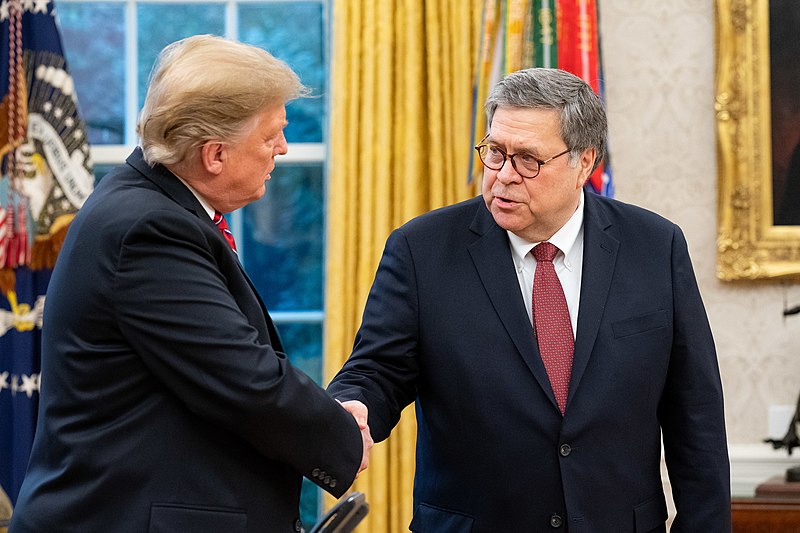AG Barr accuses Democrats of war on Trump that’s intended to ‘incapacitate the executive branch’

President Donald Trump and U.S. Attorney General William Barr. Photo from Wikimedia Commons.
The legislative and judicial branches of government are encroaching on President Donald Trump’s constitutional authority, U.S. Attorney General William Barr said Friday evening in a Federalist Society speech that took aim at Trump’s “resistance” opponents.
Barr argued that the Founding Fathers envisioned a strong, independent executive branch after rejecting a model with multiple individuals in that role. The founders expected “jostling and jousting” among the branches, but in recent years the deck has become stacked against the executive, he said in prepared remarks.
The New York Times and the Washington Post have coverage of the speech, which appears to differ slightly from prepared remarks; How Appealing links to additional coverage.
Barr argued that executive branch authority has eroded since the mid-1960s. The problem got worse after the Watergate scandal in the 1970s, and now Democrats are fighting to cripple the current administration, he said.
After Trump won the election, opponents began what they called “The Resistance,” a term that has been used to describe insurgency against an occupying military power that is not legitimate, Barr said.
But voters elected Trump to do a job, Barr said. “While the president has certainly thrown out the traditional Beltway playbook and punctilio, he was upfront about what he wanted to do, and the people decided they wanted him to serve as president,” he said.
Although the left accused Trump of shredding the Constitution, they may cite the travel ban—upheld by the U.S. Supreme Court—but provide little in the way of specifics, Barr said. In fact, “in waging a scorched-earth, no-holds-barred war against this administration, it is the left that is engaged in shredding norms and undermining the rule of law,” he said.
Lawmakers’ pursuit of scores of investigations through “an avalanche of subpoenas” is “plainly designed to incapacitate the executive branch,” he said.
Barr also argued that the judicial branch is eroding executive branch authority by appointing itself the ultimate arbiter of turf disputes between Congress and executive. Such separation-of-powers disputes are better resolved politically, he said.
“How is a court supposed to decide, for example, whether Congress’ power to collect information in pursuit of its legislative function overrides the president’s power to receive confidential advice in pursuit of his executive function?” Barr said in his prepared remarks. “Nothing in the Constitution provides a manageable standard for resolving such a question.”
Nor should courts be examining executive motive rather than executive action itself, he said. Courts are acting “like amateur psychiatrists” and intruding on Trump’s constitutional prerogatives when they order invasive discovery to determine the real motive, he said.
Barr also criticized nationwide injunctions by courts, saying they “enable transparent forum shopping,” disrupt the political process, and “foreclose percolation and reasoned debate among lower courts.”
Barr also criticized the Supreme Court’s 2008 decision Boumediene v. Bush, which held that detainees at Guantanamo Bay are entitled to pursue habeas corpus relief in the federal courts. In essence, he said, the Supreme Court superimposed rules governing domestic criminal cases on detainees in an armed conflict.
Barr said the decision wrongly conferred rights on foreign enemies. “The idea that the judiciary acts as a neutral check on the political branches to protect foreign enemies from our government is insane,” he said in prepared remarks.



